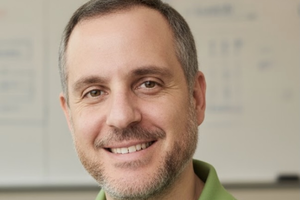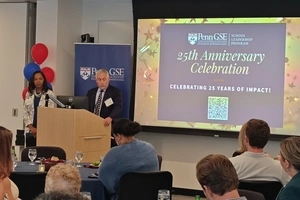These fraudulent messages do not reflect the values of Penn or Penn GSE. We sincerely apologize for the harm and distress these emails have caused and appreciate your understanding as we work quickly to resolve the issue.
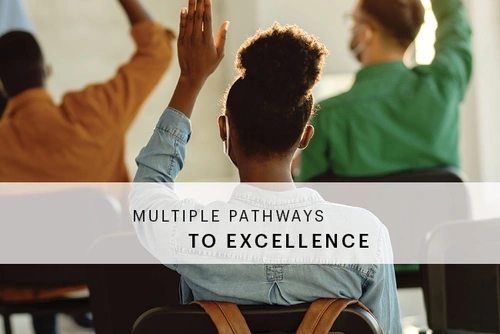
by Karen Doss Bowman
The work of teachers could not be more urgent as the nation’s children grapple with the pandemic’s disruptions to their learning and lives. At Penn GSE, teacher education has a distinguished history, and today the School’s programs are stronger than ever, offering multiple pathways to excellence through distinctive blends of coursework and practical experience.
“Teachers represent the most important school-based factor impacting student success,” says Penn GSE Dean Pam Grossman. A leading expert on teacher education, Dean Grossman is at the forefront of rethinking how teachers are prepared for their careers.
“At a time when other universities are backing away from their commitment to teacher education, Penn GSE is proud to be building and innovating around this crucial component of its mission,” says Dr. Grossman. “As a former teacher myself, one of my greatest passions is to ensure that educators have the support and tools to transform the lives of their students.”
The School’s three master’s programs in teacher education—the Urban Teaching Residency (UTR), the Independent School Teaching Residency (ISTR), and the Urban Teaching Apprenticeship Program (UTAP)—are designed to meet the needs of different career paths and school settings. Under Grossman’s leadership, Penn GSE has reconceptualized the programs, placed them under the oversight of Executive Director Patrick Sexton, and housed them alongside the Collaboratory for Teacher Education at Penn GSE, a hub for learning and research in the field. The programs welcomed newly appointed directors, all of whom are Penn GSE alumni, in the summer of 2021: Nicole Mittenfelner Carl, GED’08, GRD’17; Charlotte Jacobs, GR’17; and Christopher Pupik Dean, GED’09, GR’12.
“It is absolutely wonderful that these three accomplished teachers, teacher educators, and scholars will lead our work preparing highly capable, anti-racist preK–12 teachers for Philadelphia, other urban settings, and our partner independent schools,” says Sexton.
Representing all three programs, the recent graduates featured here are putting their learning into practice as teachers of mathematics, English, and science who are deeply committed to their students’ futures.
Moving From the Sidelines to the Classroom
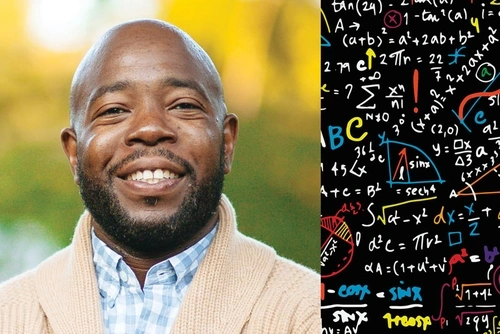
For Barry Wilkins, GED’21, the national climate on race and social justice served a difference in his hometown of Philadelphia, Wilkins left behind a fifteen-year career in investment banking and wealth management, ready to explore new ways to enrich others’ lives.
“I realized that eliminating institutional racism requires folks to get off the sidelines and take action,” says Wilkins, who began a path to a new career in 2017, serving a one-year post as director of industry partnerships for the City of Philadelphia. Drawing inspiration from his parents, he decided that “all roads point to education” when it comes to eliminating generational poverty. “My mother and father escaped poverty in the rural, segregated South through self-determination and a strong work ethic that provided greater access to opportunity,” he says.
In 2019, Wilkins enrolled in Penn GSE’s Urban Teaching Residency (UTR) program and joined the faculty of Strawberry Mansion High School, where he teaches algebra, geometry, and personal finance. “When it became clear to me that education was my calling, I knew it was important to get credentialed and ground myself in cutting-edge pedagogy and research-based practices to have a meaningful impact in the classroom,” Wilkins says.
“Never underestimate the resiliency of children who come from disadvantaged backgrounds. That experience creates a certain type of grit, and if children can survive those challenges, they can be an asset wherever they go.”
With an executive-format schedule of evening and weekend classes, the UTR program is designed to allow full-time educators to continue in their roles while earning a master’s degree and Pennsylvania teacher certification. Taught by faculty who are experienced urban educators and researchers, the program aims to support educators in underserved schools who are deeply committed to ending educational inequity. One of the program’s greatest strengths is its direct impact on urban schools, according to UTR program director Nicole Mittenfelner Carl, GED’08, GRD’17.
“UTR students live out the mission of Penn GSE on a daily basis,” Dr. Carl says. “They directly implement what they learn in their courses through their practices as teachers. Combined, UTR students impact thousands of pre-K–12 students in Philadelphia and the surrounding areas each year.”
For Wilkins, the experience of teaching while earning his degree during the pandemic was transformative. Educational inequities across the nation and at his own school became even clearer to him as he witnessed Strawberry Mansion High School and its families pivot to online learning despite limited resources. At the same time, the period strengthened his resolve and the admiration he has for his students. “Never underestimate the resiliency of children who come from disadvantaged backgrounds,” Wilkins says. “That experience creates a certain type of grit, and if children can survive those challenges, they can be an asset wherever they go.”
The UTR program takes pride in building a network of graduates who, like Wilkins, are dedicated to urban schools. “UTR has developed a strong alumni base of teachers, school leaders, policy makers, and district officials all committed to social justice and equity,” says Carl, who is a UTR graduate and former Philadelphia public school teacher.
For Wilkins, the road ahead is challenging and purposeful. “To me, being a good teacher means liberating the minds of the young people I serve and revealing their brilliance in the process,” he says. “To do that, I have to keep it real, have a vision for the future, and have the courage to demand better for young people.”
Embracing a Culture of Education
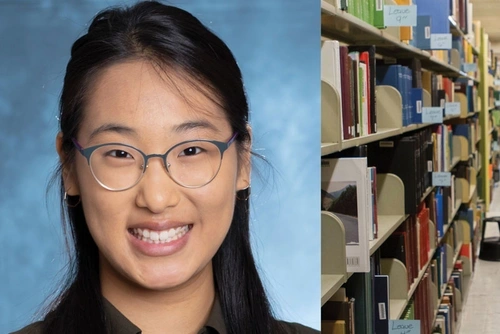
An internship at Salisbury Summer School in Connecticut enlightened Anna Kim, GED’21, on the idea of “education beyond the classroom.” The experience, which took place the summer before her senior year at Williams College, showed her how the environment of an independent school could offer a cohesive learning experience across academics, extracurriculars, and campus life for students in middle and high school.
“I came to witness the power of the incredible bonds that develop between students and teachers in these shared spaces that ultimately constitute an entire culture of education,” Kim wrote in a blog post for Williams. The experience sparked her interest in independent school teaching. After graduating from Williams, she enrolled in Penn GSE’s Independent School Teaching Residency (ISTR) program, which allows early-career teachers to earn a master’s degree while completing an intensive teaching fellowship at a partner school.
Kim undertook her fellowship at the Lawrenceville School in Lawrenceville, New Jersey. There she taught English and embraced the opportunity to get to know her students beyond the classroom. At Lawrenceville, faculty serve as advisors to students, meeting regularly with a small group of advisees to consult about all aspects of student life.
“Being able to provide academic and social-emotional mentoring felt very much like coming home to family and serving an important role,” says Kim. “I would talk with students about their experiences each week and gain context on their lives outside of academics.” That kind of insight is part of what the ISTR program aims to create through the fellowships, which are made possible by partnerships with some of the nation’s leading boarding schools and day schools.
“We have developed a robust program with twenty partner schools representing different geographical regions, school missions, and orientations to education,” says ISTR program director Charlotte Jacobs, GR’17. “Our program thinks deeply about what novice teachers need to know as they first start out in the classroom, and also provides students with a hands-on experience of other aspects of school life such as coaching, residential living, and advising.”
“Being able to provide academic and social-emotional mentoring felt very much like coming home to family and serving an important role.”
The network of partner schools not only strengthens individual ISTR students’ experiences, but also enriches the program as a whole. “It is amazing to be a part of a program where we have opportunities to exchange ideas about teaching, learning, and teacher education across such a broad network of schools,” says Dr. Jacobs.
During her time at Penn GSE, Kim valued the support of classmates and professors. She especially appreciated learning about systemic and historical inequities in education through courses taught by Associate Professor and Calvin Bland Fellow Ed Brockenbrough. “Connecting these classes with my firsthand experiences in my school both reinforced and nuanced my understanding of the equity fault lines in independent schools,” says Kim.
In August, Kim began her first year as an English teacher for ninth, eleventh, and twelfth grades at Morristown Beard School in Morristown, New Jersey. She looks forward to creating powerful learning experiences for her students and to deepening her skills and knowledge on an ongoing basis.
“Teaching is always about refreshing what we know so that we can better give to our students,” she says. “It’s important to me to be continuously stretching my own learning knowledge and pursuit of expertise.”
Making Learning into a Journey of Discovery
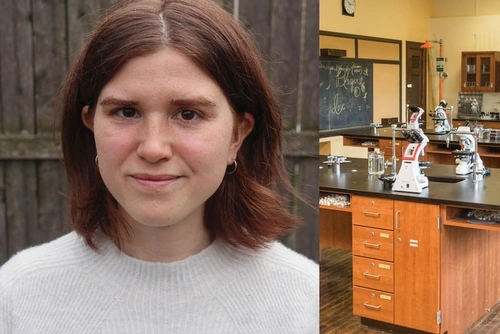
As a first-year science teacher at Eliza B. Kirkbride School in Philadelphia, Charlie (Rachel) Porter, GED’21, creates opportunities for students in sixth through eighth grade to take an active role in learning science—from exploring the earth’s formation to understanding the characteristics that define living things. As a graduate of Penn GSE’s Urban Teaching Apprenticeship Program (UTAP), Porter is well prepared to use innovative teaching tools in urban schools, in keeping with the program’s mission of deepening student learning, transforming schools, and increasing educational equity.
“Students are asking the questions, they’re planning the investigations. I guide the students through the process, but the drive for learning comes from them, which is really exciting,” says Porter.
A former English as a second language (ESL) teacher in South Korea and China, Porter majored in environmental science at Portland State University and discovered a love of teaching during her senior year.
After three years abroad as an ESL teacher, she came to UTAP at Penn GSE to move into U.S. public education as a science teacher. The full-time master’s program gave her the opportunity to undertake Penn GSE coursework while gaining more than eight hundred hours of field experience in a Philadelphia public school as an apprentice to an experienced classroom teacher. During the eight hundred hours—an amount of student teaching that exceeds the typical requirement of a teacher education program—UTAP students learn not only from classroom teachers but also from the program’s instructional coaches and mentors, who demonstrate teaching approaches and help to connect theory to practice.
“I always came out of her classes with a new way of designing classroom experiences to be a journey of discovery for students. That was empowering.”
“The apprenticeship is an opportunity to practice the student-centered pedagogical strategies that are being taught in Penn GSE courses,” says UTAP director Christopher Pupik Dean, GED’09, GR’12. “This allows a much closer alignment between university coursework and field placement than what is available in programs elsewhere.”
Through the combination of coursework, fieldwork, and professional support, UTAP students prepare to facilitate learning that puts students’ ideas and curiosity at the center of classwork and discussions. State-of-the-art techniques of student-centered learning are incorporated throughout the UTAP curriculum thanks to recent grant funding. Prospective teachers learn best practices—developed by Dean Grossman, Dr. Pupik Dean, and a Penn GSE research team—to guide a learning process that puts students in an active role of analyzing information, solving problems, and devising projects.
Looking back on her experiences, Porter particularly appreciates the mentorship she received from UTAP’s instructional coach for science, Shubha Sarode. “She imparted so much wisdom over the course of my year at UTAP,” says Porter, who completed her field placement at Kensington Creative and Performing Arts High School in Philadelphia. “I always came out of her classes with a new way of designing classroom experiences to be a journey of discovery for students. That was empowering.”
As she embarks on a new chapter of her teaching career as a Penn GSE graduate, Porter feels like she learns something new every day. “I love that I get to learn alongside my students,” she says. “Every day, I find ways to improve my own teaching. I’m always growing, and I find joy in teaching.”
This article appeared in the Fall 2021 issue of The Penn GSE Magazine.


